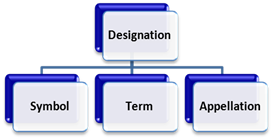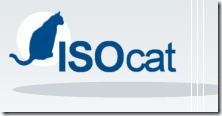The next standard to talk about is ISO 704 “Terminology work—Principles and methods.” It is an interesting one for a variety of reasons. For one, I have more questions than answers.
At the TKE (Terminology and Knowledge Engineering) Conference in Dublin, my esteemed colleagues, Hanne Erdman Thomsen, Sue Ellen Wright, Gerhard Budin and Loïc Depecker will devote a workshop to ‘Accommodating User Needs for ISO 704: Towards a New Revision of the Core International Standard on Terminology Work’. I will have a short time slot to provide input myself and therefore have been re-reviewing ISO 704 over the last few days.
As I am putting my thoughts together, I was wondering: Who knows or uses ISO 704? I would like to invite you to do two things: Click on the little survey below in this posting. And, if you haven’t done so, please tell me about yourself by participating in the survey on the Survey tab. Both surveys are anonymous and might help me understand what this standard could do. If you know the standard and have something to share about it, please leave a comment below. I would be very grateful to get your input.
Because, quite frankly, I am puzzling over this standard. I have read it three times over the past year and every time after a few weeks go by, I have to think about what this standard is actually for. I believe it stems from the fact that it is a bit wordy at the moment. It contains a lot of good information, but the presentation is ineffective.
 But now, what can it do for the reader? As its title says, it lays out the various principles underlying terminology management. For example, it tells us what objects, concepts, concept relations and concept systems are. It then goes into definitions and definition writing, before the subject of designations is discussed. Remember, this little graphic from What is a Term? As an aside, we talk about terms many times when we actually mean designations; in German, we even find the ugly Anglicism Term and its plural Terme.
But now, what can it do for the reader? As its title says, it lays out the various principles underlying terminology management. For example, it tells us what objects, concepts, concept relations and concept systems are. It then goes into definitions and definition writing, before the subject of designations is discussed. Remember, this little graphic from What is a Term? As an aside, we talk about terms many times when we actually mean designations; in German, we even find the ugly Anglicism Term and its plural Terme.
So, ISO 704 really does do what the title says, it presents us with principles and methods. It just doesn’t seem to stick with me. Yet.
[polldaddy poll=3539284] Imagine you have a large document to author or translate. Your client gave you a dictionary to use. Because you are not sure of the meaning or usage of 50 terms, you look them up. But the dictionary holds you up more than anything: One entry contains a definition, the next one doesn’t; one provides context, but it is in a language you don’t understand; most terms make sense, but several of them are cryptic and the entry doesn’t provide clarity. If your client hadn’t insisted that you use the dictionary, you wouldn’t: It just slows you down.
Imagine you have a large document to author or translate. Your client gave you a dictionary to use. Because you are not sure of the meaning or usage of 50 terms, you look them up. But the dictionary holds you up more than anything: One entry contains a definition, the next one doesn’t; one provides context, but it is in a language you don’t understand; most terms make sense, but several of them are cryptic and the entry doesn’t provide clarity. If your client hadn’t insisted that you use the dictionary, you wouldn’t: It just slows you down. The Microsoft terminology team did. Simply handing a standards document off to the team had not been successful in the past—nobody could remember it, many entries therefore contained unstructured, if not incorrect information, and there was no incentive to adhere to standards. A more collaborative effort was called for: Together, in-house terminologists went through data categories one by one. Because we were a virtual team, e-mail was the best form of communication. Each data category was dealt with in one e-mail that contained: the definition, a scenario and voting buttons that allowed the team to agree with the meaning or disagree and make a better suggestion. Team members could participate in the voting, but they didn’t have to. However, anyone knew from the beginning that they had to accept the outcome, regardless of whether they participated or not. After the new guide had been published, measurements were carried out and documented in a quarterly report. Terminologists then set their own deadlines for cleaning up entries to comply with the standards.
The Microsoft terminology team did. Simply handing a standards document off to the team had not been successful in the past—nobody could remember it, many entries therefore contained unstructured, if not incorrect information, and there was no incentive to adhere to standards. A more collaborative effort was called for: Together, in-house terminologists went through data categories one by one. Because we were a virtual team, e-mail was the best form of communication. Each data category was dealt with in one e-mail that contained: the definition, a scenario and voting buttons that allowed the team to agree with the meaning or disagree and make a better suggestion. Team members could participate in the voting, but they didn’t have to. However, anyone knew from the beginning that they had to accept the outcome, regardless of whether they participated or not. After the new guide had been published, measurements were carried out and documented in a quarterly report. Terminologists then set their own deadlines for cleaning up entries to comply with the standards.
